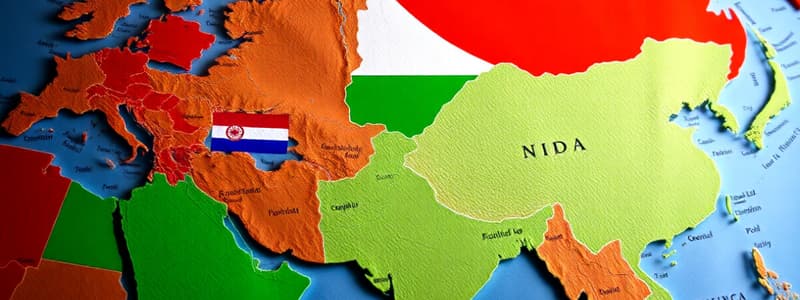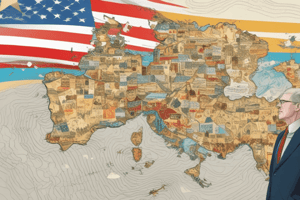Podcast
Questions and Answers
Which of the following best defines a 'nation'?
Which of the following best defines a 'nation'?
- A group of people sharing cultural similarities without necessarily having defined borders. (correct)
- A region with defined political boundaries and a governing body.
- A territorial entity recognized by the United Nations.
- An independent country with recognized international status.
What is meant by 'sovereignty'?
What is meant by 'sovereignty'?
- Having the authority to establish domestic laws and governance. (correct)
- The independence to make international treaties.
- The control over a defined territory and its resources.
- The ability to dominate other nations politically and militarily.
What is 'gerrymandering'?
What is 'gerrymandering'?
- The systematic control of a state by multiple nations.
- Manipulating international law to benefit one's own nation.
- The process of creating electoral maps favoring one political party. (correct)
- The establishment of colonies in foreign territories.
What distinguishes a 'state' from a 'nation'?
What distinguishes a 'state' from a 'nation'?
Which statement about the United Nations is correct?
Which statement about the United Nations is correct?
Which of the following is NOT a characteristic of a state?
Which of the following is NOT a characteristic of a state?
What is the primary aim of imperialism?
What is the primary aim of imperialism?
Which of the following scenarios best exemplifies an autocratic government?
Which of the following scenarios best exemplifies an autocratic government?
What is the maximum distance from a state's coastline that its Exclusive Economic Zone (EEZ) extends?
What is the maximum distance from a state's coastline that its Exclusive Economic Zone (EEZ) extends?
Which of the following is the primary goal of gerrymandering?
Which of the following is the primary goal of gerrymandering?
How did imperialism and colonialism affect the drawing of political boundaries?
How did imperialism and colonialism affect the drawing of political boundaries?
Which of the following was a primary consequence of the arbitrary boundaries drawn by colonial powers?
Which of the following was a primary consequence of the arbitrary boundaries drawn by colonial powers?
How did the actions of colonial powers impact the existing political systems of colonized territories?
How did the actions of colonial powers impact the existing political systems of colonized territories?
Which statement best describes how the legacy of colonialism continues to affect political boundaries?
Which statement best describes how the legacy of colonialism continues to affect political boundaries?
Why are the boundaries imposed by colonial powers often referred to as 'arbitrary'?
Why are the boundaries imposed by colonial powers often referred to as 'arbitrary'?
How did colonial practices contribute to cultural upheaval in colonized territories?
How did colonial practices contribute to cultural upheaval in colonized territories?
What is the primary reason that the legacy of colonial boundaries continues to influence contemporary political landscapes?
What is the primary reason that the legacy of colonial boundaries continues to influence contemporary political landscapes?
How did the exploitation of resources by colonial powers affect the development of political boundaries?
How did the exploitation of resources by colonial powers affect the development of political boundaries?
How did imperialist activities often impact existing societal structures within colonies?
How did imperialist activities often impact existing societal structures within colonies?
What is a typical consequence of establishing economic boundaries based on resource access during colonization?
What is a typical consequence of establishing economic boundaries based on resource access during colonization?
How do borders impact human settlement patterns?
How do borders impact human settlement patterns?
How can the presence of borders influence cultural exchange between societies?
How can the presence of borders influence cultural exchange between societies?
What is a potential consequence of establishing political boundaries in terms of resource accessibility and economic opportunities?
What is a potential consequence of establishing political boundaries in terms of resource accessibility and economic opportunities?
Which of the following is NOT a way in which globalization has challenged the traditional role of borders?
Which of the following is NOT a way in which globalization has challenged the traditional role of borders?
How can the redrawing of political borders affect the populations involved?
How can the redrawing of political borders affect the populations involved?
How did economic factors influence the drawing of borders during colonization?
How did economic factors influence the drawing of borders during colonization?
What is a potential consequence of the unequal distribution of resources along political borders?
What is a potential consequence of the unequal distribution of resources along political borders?
How do borders influence the movement of people across them?
How do borders influence the movement of people across them?
Flashcards
Nation
Nation
A group united by cultural similarities like language and ethnicity, often without defined borders.
State
State
A political entity with defined borders and a sovereign government, recognized internationally.
Colonialism
Colonialism
The practice of acquiring control over other areas to create colonies.
Sovereignty
Sovereignty
Signup and view all the flashcards
Gerrymandering
Gerrymandering
Signup and view all the flashcards
Imperialism
Imperialism
Signup and view all the flashcards
Law of the Sea
Law of the Sea
Signup and view all the flashcards
Autocracy
Autocracy
Signup and view all the flashcards
Democracy
Democracy
Signup and view all the flashcards
United Nations
United Nations
Signup and view all the flashcards
Political Boundaries
Political Boundaries
Signup and view all the flashcards
Human Geography Impact
Human Geography Impact
Signup and view all the flashcards
Contested Boundaries
Contested Boundaries
Signup and view all the flashcards
Arbitrary Boundaries
Arbitrary Boundaries
Signup and view all the flashcards
Post-Colonial Tensions
Post-Colonial Tensions
Signup and view all the flashcards
Resource Exploitation
Resource Exploitation
Signup and view all the flashcards
Cultural Upheaval
Cultural Upheaval
Signup and view all the flashcards
Dynamic History of Boundaries
Dynamic History of Boundaries
Signup and view all the flashcards
Impact of Boundaries
Impact of Boundaries
Signup and view all the flashcards
Economic Power Imbalances
Economic Power Imbalances
Signup and view all the flashcards
Cultural Exchange
Cultural Exchange
Signup and view all the flashcards
Border Regions
Border Regions
Signup and view all the flashcards
Conflict and Cooperation
Conflict and Cooperation
Signup and view all the flashcards
Redrawing of Boundaries
Redrawing of Boundaries
Signup and view all the flashcards
Modern Role of Borders
Modern Role of Borders
Signup and view all the flashcards
Globalization Effects
Globalization Effects
Signup and view all the flashcards
Migration and Asylum
Migration and Asylum
Signup and view all the flashcards
Socio-Economic Differences
Socio-Economic Differences
Signup and view all the flashcards
Study Notes
Nation
- Based on cultural similarities like language, ethnicity, and shared history
- Doesn't necessarily have defined borders
- Can exist across multiple states (e.g., Kurds in Turkey, Iraq, Iran, and Syria)
State
- Defined by political boundaries and a sovereign government
- Has recognized international status
- Can contain multiple nations within its borders
Example
- Nation: The Kurdish people
- State: The country of Iraq
Definitions
- Colonialism: Making colonies and taking over other areas
- Imperialism: Exploiting other countries to make your country better
- Sovereignty: Means you have power to make deals and be an independent country
- Law of the Sea: 200 nautical miles (230 miles) off the coast of a state is your EEZ (Exclusive Economic Zone)
- Gerrymandering: The party in power divides districts to get more votes
- Autocracy: One person has all the power and doesn't listen to anyone else
- Democracy: Citizens elect the people in power to have a voice
- United Nations: An international organization founded in 1945, with 193 member states, guided by its founding charter.
Studying That Suits You
Use AI to generate personalized quizzes and flashcards to suit your learning preferences.




